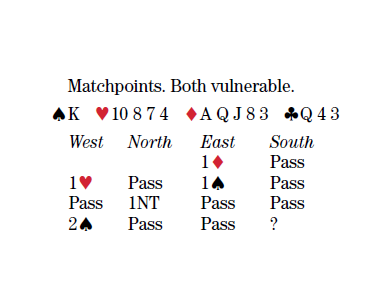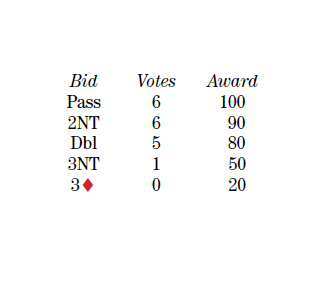
What’s your call?
| 2NT | ||||
| 3♣ | 3♦ | 3♥ | 3♠ | 3NT |
| 4♣ | 4♦ | 4♥ | 4♠ | 4NT |
| 5♣ | 5♦ | 5♥ | 5♠ | 5NT |
| 6♣ | 6♦ | 6♥ | 6♠ | 6NT |
| 7♣ | 7♦ | 7♥ | 7♠ | 7NT |
| Dbl | Pass |
Balancing act
Forced to pass three times in this auction with what many may deem an opening hand, almost two-thirds of the panel chooses to defend — six passively, by passing, and five aggressively, by doubling. Six raise partner’s balancing 1NT to 2NT. And then there’s Rebel Robinson.
Falk clarifies his pass. “Partner balanced in the pass-out seat and got them a level higher. While I expected we’d make 1NT, it was not clear where our tricks were coming from. I won’t bury partner for his enterprise.”
The Gordons pass with less introspection. “Trump lead. Oh, a bidding problem? We pass.”
“Odd that partner bid 1NT,” muses Meyers. “I think I would pass and lead the ♠K.”
The Sutherlins determine that the best chance for a plus is by defending rather than trying to make 2NT. “The points are about equally divided. We are unlikely to have an eight-card fit and trumps are not splitting for the opponents.”
Pass, says Walker. “I have defense, partner has defense and we have no known (nor likely) fit.”
The 2NT bidders are unwilling to let go quite yet. “I don’t like letting them play in their eight-card fit at the two level,” says Sanborn. “Lefty is likely short in diamonds, and attacking trumps is awkward. I have a source of tricks, so I will try for the best plus possible.”
“Definitely want to fight for the partscore,” battles Meckstroth.
“Too much stuff to pass,” says Boehm as he, too, bids 2NT. “Double would be attractive if I knew what to lead.”
Colchamiro says he went back and forth on this one, “alternating between double and 2NT.” 2NT won out. “Double seemed like it describes what I have — short spades and a hand I want to compete with. But I have too much of my strength in diamonds, I fear, for defense. Even my ♦8 might be a great card in notrump and inconsequential on defense.”
The doublers want blood.
“The matchpoint possibility of plus 200 is too hard to resist,” says Stack. “Partner has four trumps and we will lead the ♠K. Partner doesn’t have to pass the double if he has an unusual hand or cold feet.”
Cohen reaches for the red card — “Not with confidence, though.”
Lawrence anticipates that partner has around 12 HCP with four spades. “Bidding 1NT with less is asking for trouble,” knows the man whose book, The Complete Book on Balancing in Contract Bridge, is definitely worth studying. “East, at that point in the bidding, can have a pretty good hand. It would have been more interesting if you had doubled and then asked what you would lead. My second bid choice is 3NT.”
Weinstein plots: “Double. I lead the ♠K and expect this 4–4 fit won’t play well for them. I would have bid 3NT over 1NT before I would pass.”
Which brings us to the rebel. “3NT,” Robinson bids gamely. “If partner could balance with 1NT and I have this hand, I think we could easily make 3NT, which I would have bid over 1NT.”

